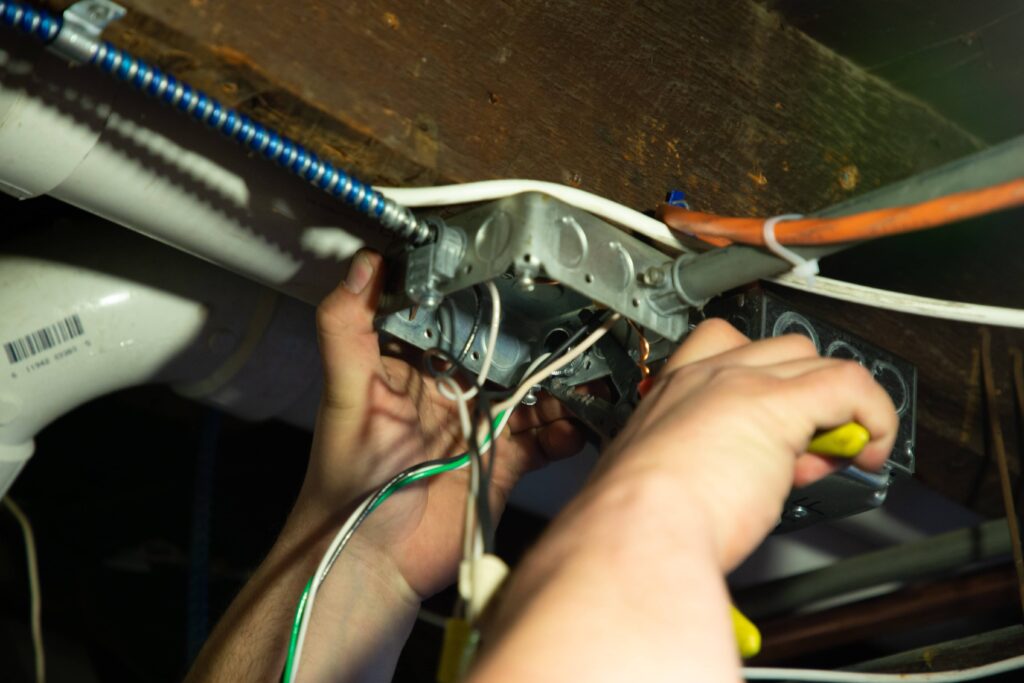
Have you ever considered a career as an electrician but felt overwhelmed by the process? Fear not! In this blog post, we’ll walk you through the ins and outs of an electrician apprenticeship, providing valuable insights and practical advice to help you make informed decisions on your journey towards a rewarding career in the electrical industry.
Key Takeaways
- Become an Electrician Apprentice by having a high school diploma, algebra skills and valid driver’s license
- Gain valuable skills, job security and potential to earn more than college grad in same amount of time through apprenticeship program
- Prepare for application process with research and organization, practice entrance exams, demonstrate good standing with employers
The Path to Becoming an Electrical Apprentice
Initiating a career as an electrician involves starting with an apprenticeship program that offers valuable on-the-job training and classroom education to refine your electrical skills. But before you dive in, there are a few prerequisites you’ll need to meet.
First, you’ll need a high school diploma or equivalent to show your fundamental understanding of the field, including basic algebra skills. Additionally, a valid driver’s license is often required for reliable transportation to job sites.
With the basics covered, it’s time to delve into the various apprenticeship programs available in the electrical industry.
High School Diploma and Algebra
A strong foundation in math, particularly high school algebra, is crucial for aspiring electricians. Algebra helps you grasp the principles of electricity and electrical systems, as well as the calculations required to complete electrical projects.
Possessing a high school diploma or its equivalent shows your dedication to education and fulfills the minimum qualifications for an electrical apprenticeship.
Valid Driver’s License
As an electrician apprentice, you’ll often be traveling to various job sites, making a valid driver’s license an essential qualification. Requirements for a driver’s license may differ depending on your state, so be sure to check with your state’s licensing board or apprenticeship program for specific details.
Preparing for the Application Process
When applying for an apprenticeship, it’s important to be well-prepared for the application and interview process. This may include:
- Submitting a high school diploma or GED
- Participating in an interview where you’ll be asked about your qualifications and goals
- Taking an aptitude test to assess your understanding of mathematics, electrical theory, and safety practices
With thorough preparation for each step, your chances of acceptance into a reputable apprenticeship program, leading to success in the electrical industry, increases.
Types of Electrical Apprenticeship Programs

As you begin exploring the electrical industry, you’ll come across various apprenticeship programs, each catering to different career paths. These programs typically include residential wireman, journeyman electrician, and electrical contractor.
At 128 Plumbing, Heating, Cooling, and Electric we’re always on the hunt for hard-working team members looking to step into this space. Visit our careers page to view any open positions available today. We’ll examine each of these programs in more detail to assist you in making an informed decision about the right path for you.
Residential Wireman
A residential wireman is a licensed electrician specializing in electrical installations for single-family homes and apartment buildings. This career path requires a solid understanding of electrical codes, safety regulations, and the ability to read and interpret blueprints. Additionally, you’ll need to install, maintain, and repair electrical systems in residential buildings.
Pursuing a career as a residential wireman offers various advantages, such as earning potential, skill development, and job satisfaction.
Journeyman Electrician
Journeyman electricians have completed an apprenticeship program and are certified to work independently on electrical systems. To achieve this level, you’ll need to complete an apprenticeship program and pass the journeyman’s exam.
Apprenticeship programs generally combine on-the-job training and classroom learning, providing a well-rounded education and skillset. As a journeyman electrician, you’ll enjoy benefits such as college credit, valuable skills, and a fulfilling career.
Electrical Contractor
Electrical contractors own businesses that specialize in the design, installation, and maintenance of electrical systems in residential, commercial, and industrial buildings. To own and operate an electrical contracting business, you’ll need to obtain a license, insurance, and ensure your employees are trained and certified in electrical work.
Additionally, staying up to date on safety regulations, codes, and industry trends is crucial to your success in this field.
On-the-Job Training and Classroom Education

An electrician apprenticeship offers the perfect balance between practical experience and theoretical knowledge. You’ll work with an IEC contractor during the day and attend classes and hands-on lessons in the evening.
This combination of on-the-job training and classroom education ensures apprentices are well-equipped to become qualified electricians in the workforce.
Electrical Wiring and Systems
During your apprenticeship, you’ll learn about electrical wiring and systems, which involve the setup of:
- cables
- switches
- distribution boards
- sockets
- light fittings
These are used for the flow of electricity to various devices. The practical skills you’ll gain include installing and maintaining electrical systems, as well as reading and interpreting blueprints.
These skills lay the foundation for a successful career in the electrical industry.
Safety Practices
Safety is paramount in the electrical industry, and apprentices must adhere to strict safety practices. During your training, you’ll learn the importance of:
- wearing the proper safety gear
- familiarizing yourself with the Electrical Code
- using GFCIs in damp or wet areas
- testing for power before working on electrical systems
- following lockout/tagout procedures
Safety prioritization not only safeguards you and your coworkers, but also guarantees the job’s correct and efficient completion.
Balancing Work and Education
Managing the demands of an apprenticeship program can be challenging, but with the right strategies, you can successfully balance work and education.
Establishing attainable goals, formulating a schedule, and incorporating regular breaks as needed can keep you focused and optimize your apprenticeship experience.
Advantages of an Electrical Apprenticeship
Pursuing an electrician apprenticeship comes with numerous benefits, including educational opportunities, valuable skills, and job security. IBEW Local 48 and NECA apprenticeship programs cover all costs for apprentices who maintain good standing, providing an affordable pathway to a fulfilling career.
Additionally, electrical apprentices can potentially earn $140,000 or more in the same amount of time as a college graduate, making it an attractive alternative to traditional college education.
Earn College Credit
Some apprenticeship programs offer college credit for completed coursework, providing an added incentive for pursuing this career path. Earning college credit through your apprenticeship not only saves you time and money, but also equips you with valuable skills and hands-on experience that make you a sought-after candidate in the job market.
Gain Valuable Skills
An electrical apprenticeship equips you with a wide range of practical and professional skills, including electrical wiring and systems, safety practices, and the ability to manage work and education.
These skills are highly valued in the electrical industry and can open doors to a variety of rewarding career paths.
Secure Employment in a Rewarding Career
The electrical industry offers job security and fulfillment, with a strong outlook for electrician jobs and a high demand for skilled workers.
By completing an apprenticeship, you set yourself up for success in a field that offers numerous opportunities for growth and advancement.
Finding the Right Apprenticeship Program
Selecting the best apprenticeship program for your needs and goals is crucial to your success in the electrical industry. It’s important to research potential employers, understand labor statistics, and evaluate various training programs to make an informed decision about your future.
We’ll delve deeper into these aspects.
Research Potential Employers
Investigating potential employers is essential to finding the right apprenticeship program for you. Researching the company’s background, current projects, safety record, and standing in the industry can help you make an informed decision about which employer best aligns with your career goals and values. Investing time into researching potential employers can guide your decision-making for choosing the right apprenticeship.
At 128 Heating, Plumbing, Cooling, and Electric you’re more than just a number. Our electricians and team members pride themselves on the amazing and supportive community that 128 is built upon. We’re a growing company, always looking for hard working team players committed to customer experience. If you’re interested in our open opportunities contact us today or view our careers page to learn more about open roles.
Understand Labor Statistics
Scrutinizing industry trends and job outlooks is vital for making well-informed career decisions in the electrical industry. Labor statistics can provide insights into the demand for electricians, the potential for career growth, and average pay rates, helping you better understand the opportunities available in the field.
Evaluate Training Programs
Evaluating various apprenticeship programs is key to finding the perfect fit for your aspirations and needs. When evaluating training programs, consider the following factors:
- The quality of instruction
- The effectiveness of the curriculum
- The availability of resources
- The cost of the program
- The success rate of graduates
Taking these factors into account will help you make an informed decision and find the apprenticeship program that is right for you.
Navigating the Application and Testing Process
Successfully applying for and completing an electrician apprenticeship program involves several steps, including:
- Submitting your application
- Preparing for entrance exams
- Demonstrating good standing with previous employers
- Staying organized throughout the process
We’ll further dissect these steps.
Preparing for Entrance Exams
Preparation for entrance exams is key to fulfilling apprenticeship programs’ requirements and demonstrating your knowledge and expertise in the field. To increase your chances of success, practice with sample questions, review the material that will be on the exam, and arrive early on the day of the test.
Demonstrating Good Standing with Previous Employers
Maintaining a positive employment history is essential when applying for an electrical apprenticeship. Being dependable, punctual, and professional with all your employers demonstrates your dedication, reliability, and enthusiasm for the field, giving potential employers confidence in your ability to succeed in their apprenticeship program.
Having a strong employment history is a great way to show potential employers that you are a reliable candidate.
Staying Organized Throughout the Process
Organization during the application and training process is essential to comply with the regulated training hours, accomplish tasks and objectives, and monitor your progress, assignments, and deadlines.
Setting goals and deadlines, breaking down tasks into smaller chunks, and creating a timeline for completing each task can help you stay on track and make the most of your apprenticeship experience.
Summary
In conclusion, pursuing an electrician apprenticeship is a valuable and rewarding career path with numerous benefits, including educational opportunities, valuable skills, and job security. By following the steps outlined in this blog post, you can successfully navigate the process of becoming an electrician apprentice and embark on a fulfilling career in the electrical industry. Remember, researching potential employers, understanding labor statistics, and evaluating training programs are essential to finding the right apprenticeship program and ensuring your success in the electrical field.
If you’re looking to start your career as an electrician be sure to check our career page for open opportunities or simply reach out andcall us today!
Frequently Asked Questions
What are the prerequisites for becoming an electrician apprentice?
To become an electrician apprentice, you need a high school diploma or equivalent, basic algebra skills, and a valid driver’s license.
What types of electrical apprenticeship programs are available?
Various types of electrical apprenticeship programs are available, such as residential wireman, journeyman electrician, and electrical contractor.
How do I find the right apprenticeship program?
Do your research and evaluate your options to make sure you find the right apprenticeship program that best suits your needs.Take a close look at potential employers, labor statistics, and training programs so you can make an informed decision.




